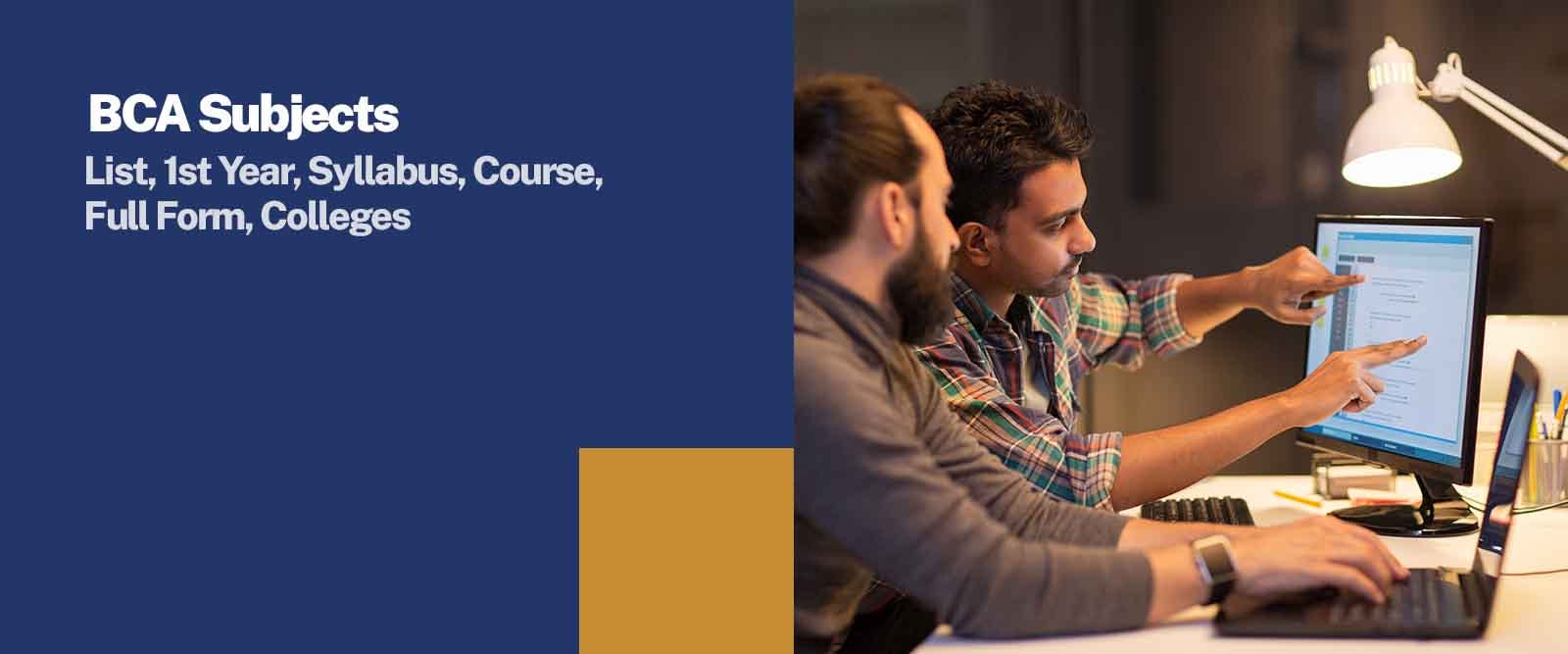5800 students unlocked their dream jobs with UG/PG programs in top colleges. Apply Now!
A career in Information Technology has evolved into a lucrative option in recent years, with most businesses adopting digitisation and technology with open arms. This is why a BCA or Bachelor of Computer Applications degree has started gaining traction among students. The BCA syllabus covers essential topics to help students develop strong fundamentals in computer applications, networking, database management, etc. In this article, we will talk about BCA degree subjects and other important things that you need to know about the course.
BCA – Structure
BCA is a three-year undergraduate course dealing with various aspects of the applications of computer science in the world. BCA course subjects are designed to train students to fit into the fast-evolving world of Computer Applications.
Broadly speaking, BCA Syllabus revolves around the following topics:
- Programming Using C – You will learn how to logically understand a problem and write programs in C to solve them.
- Statistics – You will learn about various statistical measures and how to use them.
- Digital Computer Fundamentals – You will learn about how a computer functions and how to use Boolean Algebra.
- Operating Systems – This will help you understand all about operating systems and their different operations.
- Data Structures – You will learn the importance and need for data structure in an application.
- Graph Theory and Linear Programming – You will learn how to understand and solve linear programming problems using graphical and simplex methods.
- Database Management Systems – You will learn how to efficiently run and manage database management systems.
- Object-oriented Programming using C++ - You will learn to use object-oriented programming and develop small-to-medium-sized programs.
- Java Programming – You will learn all about Java programming.
- Computer Networks – You will learn all about the different components of a computer network.
- Computer Graphics and Animation
BCA Syllabus
When you enrol for a BCA course, you must attend classroom lectures, lab sessions, seminars, presentations, and project work and interact with industry experts. The BCA syllabus includes:
- Core courses = 2
- Concurrent courses = 2
- Theory and practical papers carry an equal emphasis
- Submit a project report in the final year
- Various skills needed on the job like communication skills, teamwork, etc.
The entire course is divided into six semesters. Here is a quick look at BCA subjects semester-wise:
|
Semester I |
Semester II |
|
Foundational Mathematics |
Basic Discrete Mathematics |
|
Hardware Lab (CIA Only) |
Case Tools Lab (CIA Only) |
|
Creative English |
Communicative English |
|
Statistics I For BCA |
Operating Systems |
|
Introduction To Programming Using C |
Data Structures Lab |
|
Digital Computer Fundamentals |
Data Structures |
|
C Programming Lab |
Visual Programming Lab |
|
PC Software Lab |
- |
|
Semester III |
Semester IV |
|
Interpersonal Communication |
Professional English |
|
Financial Accounting |
Computer Networks |
|
Introductory Algebra |
Financial Management |
|
Database Management Systems |
Java Programming Lab |
|
Software Engineering |
Programming In Java |
|
C++ Lab |
Web Technology Lab |
|
Object Oriented Programming Using C++ |
DBMS Project Lab |
|
Oracle Lab |
Language Lab(CIA Only) |
|
Domain Lab (Cia Only) |
- |
|
Semester V |
Semester VI |
|
Graphics And Animation |
Cloud Computing |
|
Unix Programming |
Design And Analysis Of Algorithms |
|
User Interface Design |
Computer Architecture |
|
OOAD Using UML |
Client-Server Computing |
|
Python Programming |
Multimedia Applications |
|
Unix Lab |
Advanced Database Management System |
|
Business Intelligence |
Introduction To Soft Computing |
|
Web Designing Project |
- |
|
Graphics And Animation Lab |
- |
|
Python Programming Lab |
- |
|
Business Intelligence Lab |
- |
BCA Subjects
BCA is available in two specialisations:
- Data Science
- Data Analytics
Here is a quick look at the BCA subjects you will learn during the course across both specialisations.
BCA Data Science Subjects
|
Semester I |
Semester II |
|
Cultural Education 1 |
Cultural Education 2 |
|
Communicative English |
Language Paper 2 |
|
Language 1 |
Professional Communication |
|
Discrete Mathematics |
Statistics and Probability |
|
Environmental Science and Sustainability |
Database Management System |
|
Computer Essentials for Data Science |
Data Structure and Algorithm |
|
Computational Thinking and Programming in C |
Operating System |
|
Computational Thinking and Programming in C Lab |
Database Management System Lab |
|
- |
Data Structures Lab |
|
Semester III |
Semester IV |
|
Life Skills 1 |
Life Skills 2 |
|
Essential of Data Collection Ethics |
Introduction to Data Mining |
|
Descriptive Statistics |
Python Programming |
|
Computer Networks |
Open Elective A* |
|
Object Oriented Programming using C++ |
Introduction to Java and Web Programming |
|
Software Engineering |
Python Programming Lab |
|
Scripting Technologies Lab |
Elective A |
|
Practical Exposure to Data Collection Lab |
Java Programming Lab |
|
- |
- |
|
Semester V |
Semester VI |
|
Data Modelling and Visualization |
Big Data Analytics |
|
R Programming for Data Sciences |
Information and Data Security |
|
Machine Learning |
Natural Language Processing |
|
Elective B |
Elective C |
|
Introduction to Parallel Programming and Data Optimization |
Big Data Analytics Lab |
|
Open Elective B* |
Project |
|
Introduction to Parallel Programming Lab |
- |
|
Fundamentals of Machine Learning Lab |
- |
|
Minor Project |
- |
BCA Data Analytics Subjects
|
Semester I |
Semester II |
|
English for Professionals |
Mathematics for Data Scientists -- II |
|
Communication skills |
Data Structures and Algorithms |
|
Mathematics for Data Scientists - I |
Object Oriented Programming using Java |
|
Computer Architecture & Organization |
Probability & Statistics - I |
|
Operating System |
Introduction to Data Science |
|
Programming in C |
Excel for Data Scientists (Tool Based) |
|
Operating System Lab |
Data Structures and Algorithms Lab |
|
Programming in C Lab |
Object Oriented Programming using Java Lab |
|
Semester III |
Semester IV |
|
Software Engineering |
Data Manipulation Using PL / SQL Programming |
|
Database Management Systems |
Big Data Analytics (Tool Based) |
|
Reasoning and Thinking |
Inferential Statistics |
|
Probability & Statistics - II |
Machine Learning Algorithms - I (Tool Based) |
|
Scientific Programming Using R (Tool Based) |
Business Communication and Presentation Skills / Professional Ethics |
|
Computer Networks |
Exploratory Data Analysis (Tool Based) |
|
Software Engineering Lab |
Data Manipulation Using PL / SQL Programming Lab |
|
Database Management Systems Lab |
Inferential Statistics Lab |
|
Semester V |
Semester VI |
|
Cloud Computing |
Project and Viva-Voce |
|
Times Series Analysis |
Elective - III |
|
Machine Learning Algorithms - II (Tool Based) |
List of Electives: |
|
Elective – I |
Internet of Things |
|
Data Visualization (Tool Based) |
Elective – I (Any One) |
|
Elective – II |
Artificial Intelligence |
|
Cloud Computing Lab |
- |
|
Times Series Analysis Lab |
Neural Networks |
|
Elective – III (Any One) |
Elective – II (Any One) |
|
Data Science Industry Use Cases |
Reinforcement Learning |
|
Data Science Project Management |
Natural Language Processing |
|
Advance in Data Science |
Real-Time Data Processing |
It is important to remember that the syllabus and subjects can vary across universities and colleges. The BCA subjects mentioned above can give you an idea of the type of topics you can expect to learn through the course. To get the final list, you need to check with the college.
Summing Up
A BCA course can help you start your career in the desired direction from a very young age. It is ideal for students looking to pursue a career in IT and computer applications. After completing the course, they can opt for higher education or look for a job.
If you want to ensure you get a job right after graduation, choose a college offering Sunstone’s benefits. Almost 1000 recruiters recruit from Sunstone's pool of talents. Sunstone has over 50 campuses in 30+ cities, helping candidates acquire the job-focused skills required for a successful career. When you sign up with Sunstone, you can participate in training programs and get 100% placement assistance after the course completion.
HELP
Take the first step towards your dream job.
ABOUT THE AUTHOR

